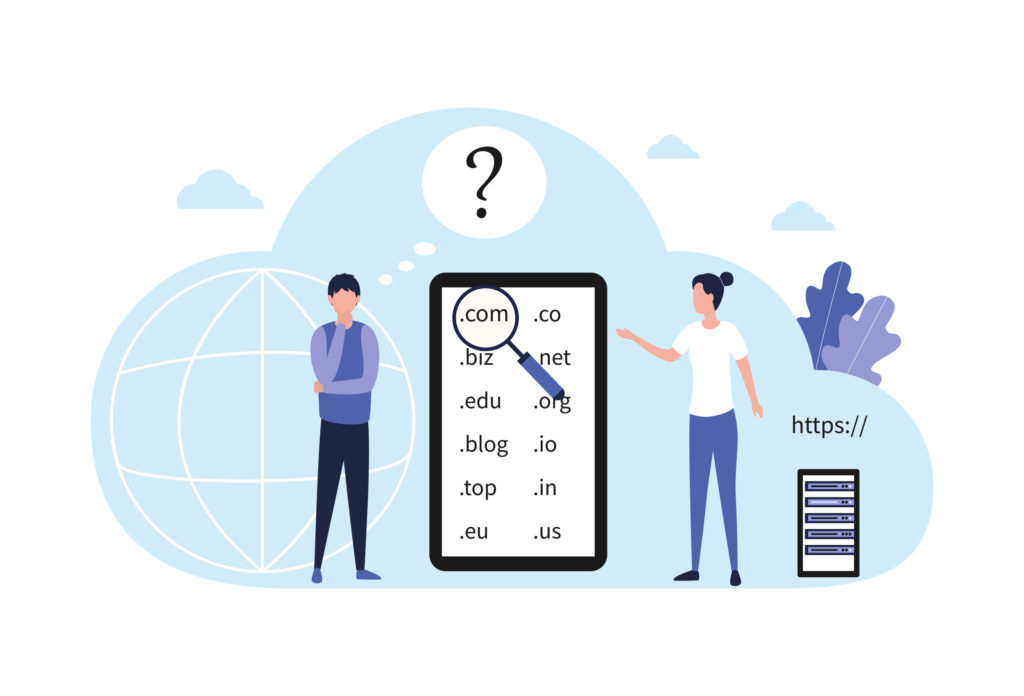For nonprofits and social impact projects, every detail of your online presence matters. Your domain name is more than a web address, it’s a piece of your identity. A report from Nonprofits Source found that 54% of donors worldwide prefer to give online. If people don’t trust your domain, they may never reach your donation page.
Nonprofits rely on credibility more than most businesses. A retailer can win customers with discounts or flashy ads, but donors want reassurance that their money’s going to the right place. Something as simple as a domain extension can send that signal. Choose poorly, and visitors may hesitate to give. Choose wisely, and you create confidence before they even land on your homepage.
Picking the right extension helps build that trust. It signals credibility, makes your site easier to remember, and helps supporters feel confident clicking through. Website builders like Wix simplify the process by letting you register a domain and design your site in one place, so you’re not juggling multiple tools.
TL;DR
- Choosing the right domain extension fosters trust; 54% of donors prefer online giving, emphasizing the need for credibility.
- Extensions like .org and .ngo are recommended for their broad recognition and added validation for nonprofits.
- Avoid obscure extensions; clarity and simplicity can significantly impact donor engagement and retention.
- Domain names should reflect long-term branding to avoid confusion and enhance recognition.
- Extensions can also align with organizational missions, like .earth for environmental causes.
How to Choose from a TLD List for Nonprofits
When you scan a TLD list, you’re looking at top-level domains, the letters that follow the dot in your web address. Options now stretch far beyond .org. Picking the right one helps donors, partners, and volunteers trust your site and remember it later.
Ask yourself a few key questions:
- Does the extension instantly feel credible?
- Will visitors connect it to nonprofit or social impact work?
- Is it short enough to share easily?
- Can you get your organization’s name without long add-ons?
Why Your Domain Extension Matters for Trust and Recognition

Visitors notice domain endings quickly. An extension they trust makes them more likely to click, while an unusual one can cause hesitation. For nonprofits that rely on donations, recognition is critical.
Think of the difference between “GreenEarth.org” and “GreenEarthXYZ.net.” The first feels credible and professional, the second feels less certain. People are far more likely to share and remember the .org option.
There are also real-world examples where the wrong choice created confusion. Some small charities that picked less common extensions have reported donors accidentally landing on unrelated sites with more familiar endings. In competitive spaces like environmental causes or international aid, losing traffic that way means losing potential donations.
Extensions can also reinforce your mission. A climate-focused nonprofit that uses .earth is sending a message right in the web address. A community center using .community instantly shows its purpose. Donors, volunteers, and even journalists pick up on those cues.
Popular Domain Extensions for Nonprofits

.org
The long-standing choice for nonprofits. It’s widely recognized and trusted, making it the go-to if available. Large organizations such as cultural institutions, educational groups, and global charities often use it. If you want broad credibility, .org is hard to beat.
.ngo and .ong
These extensions require validation, which adds credibility. They’re especially useful for organizations working across borders. A global advocacy group using .ngo signals legitimacy to audiences in different countries.
.foundation
Clear and direct. A strong choice for grant-making bodies or charitable foundations. A name like “BrightFuture.foundation” communicates immediately that you support others through funding.
.charity
Straightforward and mission-driven. Ideal for organizations focused mainly on fundraising. For campaigns built around giving, the domain extension ‘.charity’ helps reinforce the message.
.give
Short and powerful. Works well for donation-focused projects, especially when paired with memorable branding. A seasonal drive or a permanent donation hub can benefit from this concise option.
.earth
Perfect for environmental and sustainability projects. It makes the mission clear to anyone who sees it. For climate nonprofits or conservation groups, it adds context without needing explanation.
.community
Highlights outreach, unity, and service. Great for grassroots organizations and local projects. A youth center, neighborhood group, or advocacy network can all use it to emphasize connection.
Which is better, .ngo or .org?
Both are strong. .org is better known, while .ngo signals added validation. For groups working internationally, .ngo may carry extra weight. For smaller, local nonprofits, .org often delivers the broad recognition needed.
Common Mistakes When Picking a Domain Extension
Even with strong options, nonprofits sometimes make choices that hold them back.
- Picking an extension that confuses people: A long or uncommon ending may reduce trust. If donors hesitate, you risk losing them to another group.
- Ignoring recognition: Visitors are more likely to click on extensions they know. If you choose something too obscure, people may second-guess the site.
- Choosing only for short-term use: A campaign-specific extension may limit growth later. It can also make your organization look temporary.
- Forgetting about availability: If the only version you can get forces a long, clunky domain, it may be better to consider a different extension.
Consider a food bank that launches with “HelpingHands2025.org.” It works during that year but feels dated quickly. “HelpingHands.org” would serve for decades, avoid confusion, and build a consistent brand.
Building a Long-Term Identity with the Right TLD
Your domain should last as long as your mission. Extensions are part of your brand, just like a logo or tagline. Consistency across your website, social channels, and email addresses builds recognition and trust.
For example, a foundation that secures “BrightFuture.foundation” can use matching branding across all platforms. Over time, supporters begin to associate the domain with credibility and reliability.
Global versus local reach matters too. A small community group may find .community resonates more with local donors, while an international relief effort may benefit from .ngo. The extension you choose influences how people perceive your scale and focus.
The right builder helps here too. It’ll let you register a domain as part of setting up your site. That reduces the risk of mismatched branding and keeps your digital identity consistent from day one.
FAQ
Why is selecting the right domain extension important for nonprofits?
Selecting the right domain extension is crucial for nonprofits because it builds credibility and trust among potential donors. A well-chosen domain extension signals professionalism and conveys a sense of legitimacy, which is essential since donors are more likely to give when they feel assured that their contributions will go to a credible organization. For instance, extensions like .org are widely recognized as authoritative for nonprofits, enhancing the overall trustworthiness of the site.
What are some of the most preferred domain extensions for nonprofit organizations?
Some of the most preferred domain extensions for nonprofit organizations include .org, .ngo, .ong, .foundation, .charity, .give, .earth, and .community. Each of these extensions serves a specific purpose; for example, .org is the traditional choice that conveys broad recognition, while .ngo and .ong require validation to signal legitimacy for international organizations. Extensions like .foundation and .charity clearly communicate the mission towards funding and fundraising, respectively.
What common mistakes should nonprofits avoid when choosing a domain extension?
Nonprofits should avoid several common mistakes when choosing a domain extension. These include selecting an extension that confuses potential visitors, opting for obscure or uncommon endings that may reduce trust, focusing only on short-term campaigns instead of long-term branding, and not verifying the availability of desired domain names. For example, a long or complicated domain may reduce visitor confidence, and a campaign-specific extension could limit future growth.
How does a domain extension impact donor perception?
A domain extension significantly impacts donor perception because it acts as an immediate cue to credibility and professionalism. Extensions that are recognized and trusted, such as .org, lead to higher chances of visitors engaging with the site, while unusual or less familiar extensions can lead to hesitation and doubt. For example, a nonprofit using a standard extension like .org is more likely to earn trust compared to one using a less common extension, thereby enhancing donation willingness.
What considerations should nonprofits keep in mind when choosing a top-level domain (TLD)?
When choosing a top-level domain (TLD), nonprofits should consider several factors: the credibility that the extension conveys, whether it connects directly to nonprofit or social impact work, the length and ease of sharing the domain, and the availability of their organization’s name without unnecessary add-ons. These factors help ensure that the domain is memorable, trustworthy, and suitable for the nonprofit’s long-term identity and branding.


